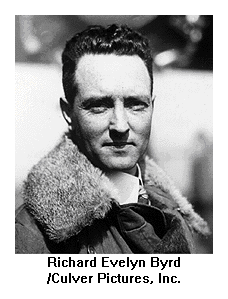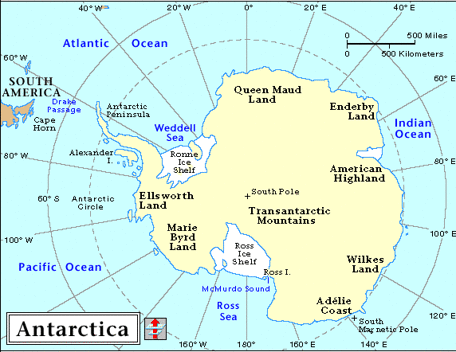Alone (25 page)
Authors: Richard E. Byrd

Suddenly the light disappeared. The car had dipped into one of the shallow valleys with which the Barrier abounds, and the intervening ridge had blotted it out. Therefore the tractor must be some distance off, and I doubted that it would reach me for another two hours. After lighting another can of gasoline -- that left only two -- and the next to the last flare, I went below, intending to prepare supper for my three guests. I dumped a couple of cans of soup into a pan, and set them on the fire to heat.
When next I peered from the hatch, I saw the searchlight very clearly -- so clearly, in fact, that I was able to decide that it was fixed to the side of the cabin. Even then, I decided, they were still about five miles off. It would take them another hour to run out the journey. So I sat down in the snow to await the conclusion of this wonderful event. In a little while I could hear on the clear, vibrant air the rumble of the treads, then the
beep-beep-beep
of the horn. But the car was not appreciably nearer. Feeling cold, I went below and huddled beside the fire for a little while. It was hard to sit still when a miracle was being contrived overhead; yet, I compelled myself to do so lest I collapse completely. I looked around the shack and thought how different it would be in a few minutes. It was a filthy mess, and I remembered being ashamed that Poulter and the others should find me in such a state; but, while I did make a few feeble passes at the untidy heaps, I was too weak to do much about them.A few minutes before midnight I went topside again. They had come very close. I could see the bulking shadow of the tractor. As a greeting I set off the last can of gasoline and the last flare. They were just dying when the car stopped about a hundred yards away. Three men jumped out, with Poulter in the center, looming doubly big in furs. I stood up, but I did not dare to walk forward. I remember shaking hands all around, and Waite insists that I said: "Hello, fellows. Come on below. I have a bowl of hot soup waiting for you." If that is really so, then I can only plead that no theatricalism was intended. The truth is that I could find no words to transport outward what was really in my heart. It is also said that I collapsed at the foot of the ladder. I have only a muddled impression of that and a slightly clearer one of trying to hide my weakness. Nevertheless, I do remember sitting on the bunk, watching Poulter and Demas and Waite gulp down the soup and the biscuits; and I do remember what their voices were like, even if I am not sure of what they said. And I do remember thinking that much of what they said was as meaningless as if it were spoken in an unfamiliar tongue; for they had been together for a long time, occupied with common experiences, and in their talk they could take a good deal for granted. I was a stranger.
*****
All this happened a little after midnight, August 11, 1934. Two months and four days passed before I was able to return to Little America -- which was all to the good, since it enabled us to extend the meteorological recordings that much longer. This second wait was also a long one, but I was in no shape to leave earlier than I did. I could not possibly have survived a trip back in the tractor, and I hesitated to risk an airplane until I had enough endurance to withstand the rigors of a forced landing, always a possibility in that part of the world. It is a tribute to Poulter's self-restraint that he never once brought up the question of my returning. Neither, until toward the end, did Charlie Murphy, who continued to act as a buffer, relaying only those expedition matters which required my final decision. "We are all happy beyond words over the way things have turned out," he radioed Poulter. "Tell him that he will find an expedition ready to go when he throws the switch."
The two months that followed the tractor's coming were as pleasant as the others had been miserable. True, with four of us in the shack, we couldn't move without getting in each other's way. At night the three of them used to spread their sleeping bags on the deck and sleep shoulder to shoulder like three Musketeers. Demas and Waite took turns at cooking and cleaning house; Poulter looked after the instruments, and observed meteors as long as the darkness lasted. For a long time they wouldn't allow me to do anything; and, to tell the truth, I didn't insist beyond the requirements of simple courtesy. For it was wonderful not to have to do anything for a change. The darkness lifted from my heart, just as it presently did from the Barrier, with a tremendous inrush of white light. I was a long time regaining my strength, but little by little it came back, and with it some of my lost weight.
Yet, for a reason that I can't wholly explain, except in terms of pride, I concealed from these men, as best I could, the true extent of my weakness. I never mentioned and, therefore, never acknowledged it. On their side, the men never pressed me to tell what had happened before they came. They must have had their own ideas when they cleaned up the mess, but whatever they thought they kept to themselves. The self-preservation instinct of leadership and a sense of shame over my flimsiness drove me to wall off the immediate past. I wanted no one to be able to look over the wall; also, something deep inside me demanded that I close my mind to the notion that I had been rescued.
Pride contrives its own special vindications. I was for a long time convinced that whether the tractors had come or not, I could have stuck it out alone. As indeed I might, had it not been for that damnable hand generator. However, that is beside the point. The point is that I needed help badly; and the least that I can do is to express my everlasting gratitude to Poulter and Demas and Waite and Charlie Murphy.
On October 14th Bowlin and Schlossbach arrived from Little America in the Pilgrim. The sun was already high in the sky, and Bowlin told me that the main sledging parties were making ready to start on their three-months' journeys. Poulter said he would fly back with me. Waite and Demas stayed behind to strip the last sheets from the recording drums, and stow the personal gear and the weather records on the tractor. I climbed the hatch and never looked back. Part of me remained forever at Latitude 80 degrees 08 minutes South: what survived of my youth, my vanity, perhaps, and certainly my skepticism. On the other hand, I did take away something that I had not fully possessed before: appreciation of the sheer beauty and miracle of being alive, and a humble set of values. All this happened four years ago. Civilization has not altered my ideas. I live more simply now, and with more peace.
Before I close this story of Advance Base, I must mention one more thing I learned as a result of what happened to me there. Eager as I was to step directly into the responsibilities of leadership on my return to Little America, I was not long in discovering that a few were beyond me. The medico said that if I flew I should have only myself to blame for the consequences. While I did, in fact, command the first important flight into the unknown -- and these flights have been my biggest interest -- and another one later on, I had to be satisfied to stay on the ground after that and turn the tricky navigation of the big Condor over to Ken Rawson. Rawson was then only twenty-three years old and, if I remember correctly, had been in the air but once or twice in his life. He performed his job to perfection. No better compliment is possible than the simple statement that the two hard-boiled veteran Navy pilots who sat forward of him never questioned his reckoning. So I say in conclusion: A man doesn't begin to attain wisdom until he recognizes that he is no longer indispensable.
http://www.primenet.com/~klaatu/ ||
[email protected]
|| Optimized for Netscape
Richard Evelyn Byrd, b. Winchester, Va., Oct. 25, 1888, d. Mar. 11, 1957, was an aviator, Antarctic explorer, and author. He attended the U.S. Naval Academy and later became an aviator. In 1925 he commanded a naval flying unit on the MacMillan expedition to the Arctic, and on May 9, 1926, he and Floyd Bennett flew over the North Pole, for which Byrd was awarded the Congressional Medal of Honor. With backing from private donors, Byrd organized (1928) an expedition to Antarctica, establishing a base called Little America on the Ross Ice Shelf near Roosevelt Island. With three companions, he flew (1929) to the South Pole and back. On his return to the United States he was given a hero's welcome and promoted to the rank of rear admiral. Byrd led further Antarctic expeditions in 1933-35, 1939-41, 1946-47, and 1955-56. In 1934 he spent five months by himself near the South Pole, an experience described in his book, Alone (1938).
Bibliography: Gladych, Martin, Admiral Byrd of Antarctica (1960); Hoyt, E. P., The Last Explorer (1968); Montague, Richard, Oceans, Poles and Airmen (1971).
ALONE
INDEX
http://www.primenet.com/~klaatu/ ||
[email protected]
|| Optimized for Netscape
LITTLE AMERICAThe principal U.S. base in Antarctica, lies on the northeastern edge of Ross Ice Shelf near Kainan Bay. First set up in 1928 as the headquarters for the polar explorations of Commander Richard E. Byrd, it was reused and enlarged by Byrd on his return expedition in 1933-35. In 1940 Byrd established a camp 7 miles (11 kilometers) northeast (later named Little America III) that served as the west base for a government-sponsored exploration of Marie Byrd Land before World War II. After the war, Little America IV, consisting of an airstrip and 60 tents, was set up nearby as a headquarters for Operation High Jump, a scientific expedition having political overtones (namely, extending U.S. sovereignty to Antarctica). It served as the base from which more than 100 flights photographed the Antarctic coast and charted an area estimated at 350,000 square miles (905,000 sq km). When an expedition next returned (1956) in preparation for International Geophysical Year (1957-1958), parts of the earlier Little America camps were found to have vanished because of calving of the ice shelf. Consequently, Little America V was set up several miles northeast (near Kainan Bay) to serve as a supply base and terminus of a 630-mile-long "highway" to Byrd Station in the continent's interior.From Encyclopedia Britannica, 15th edition


